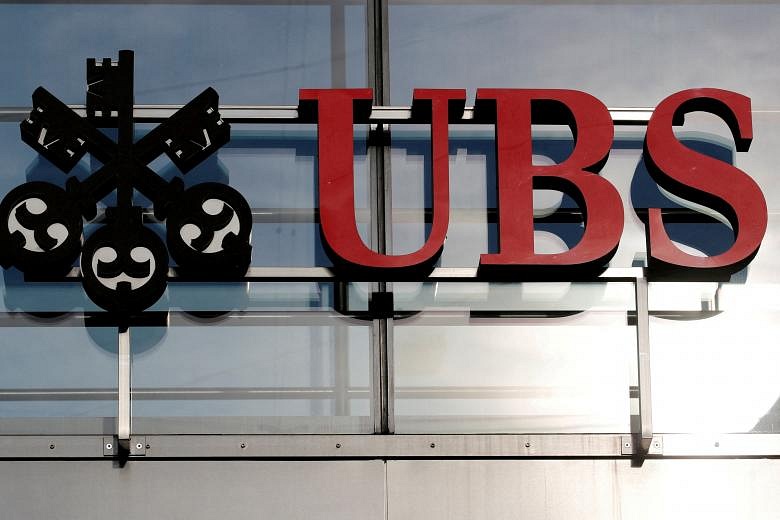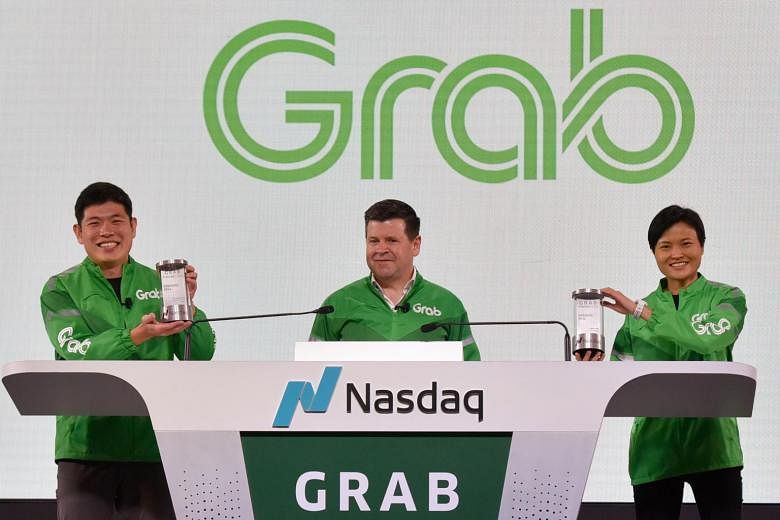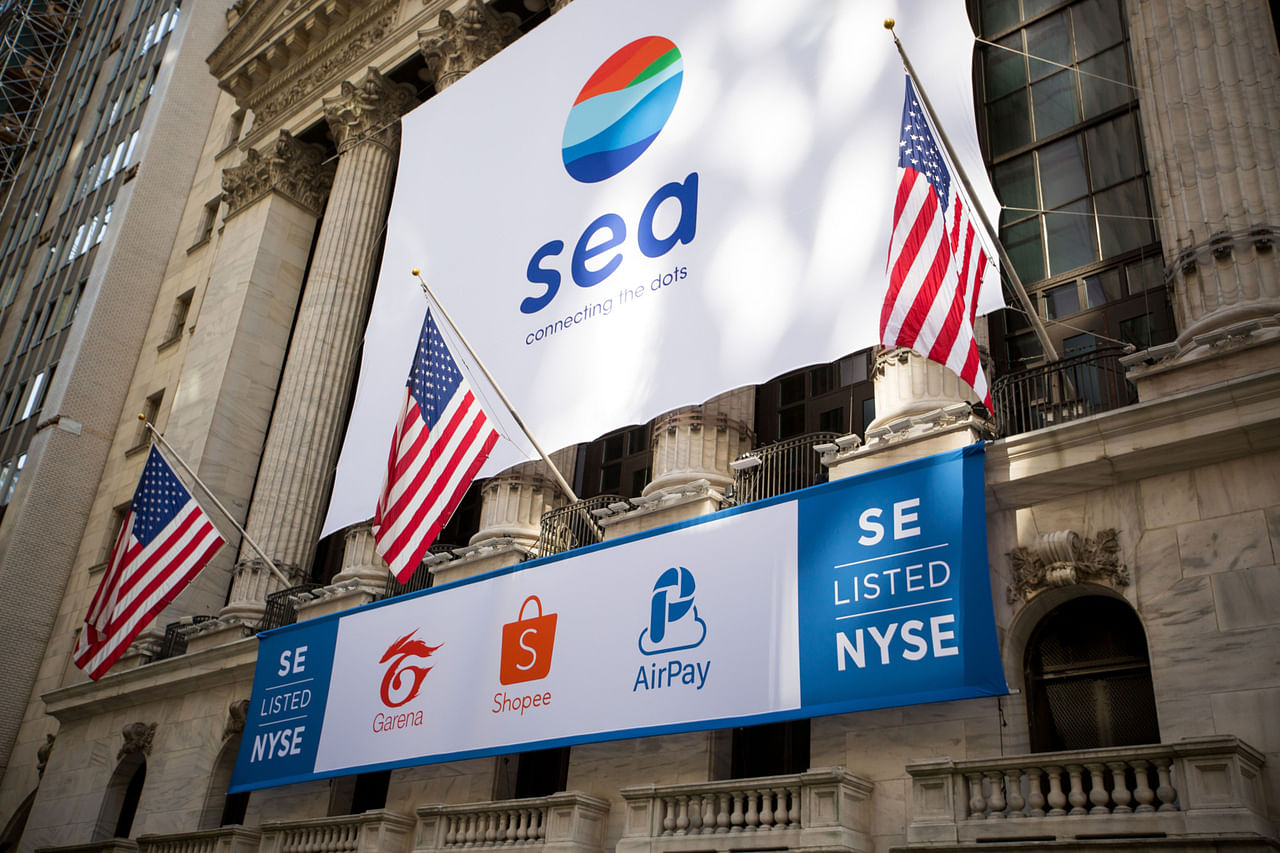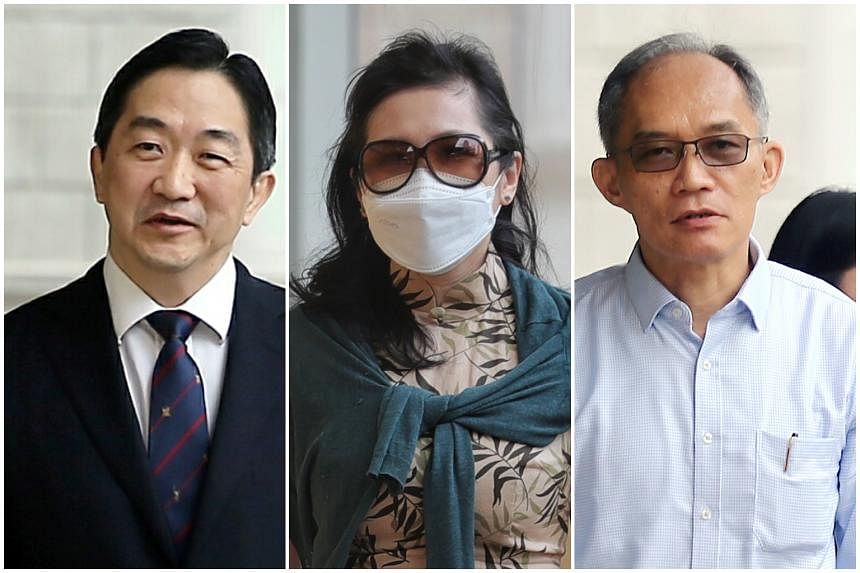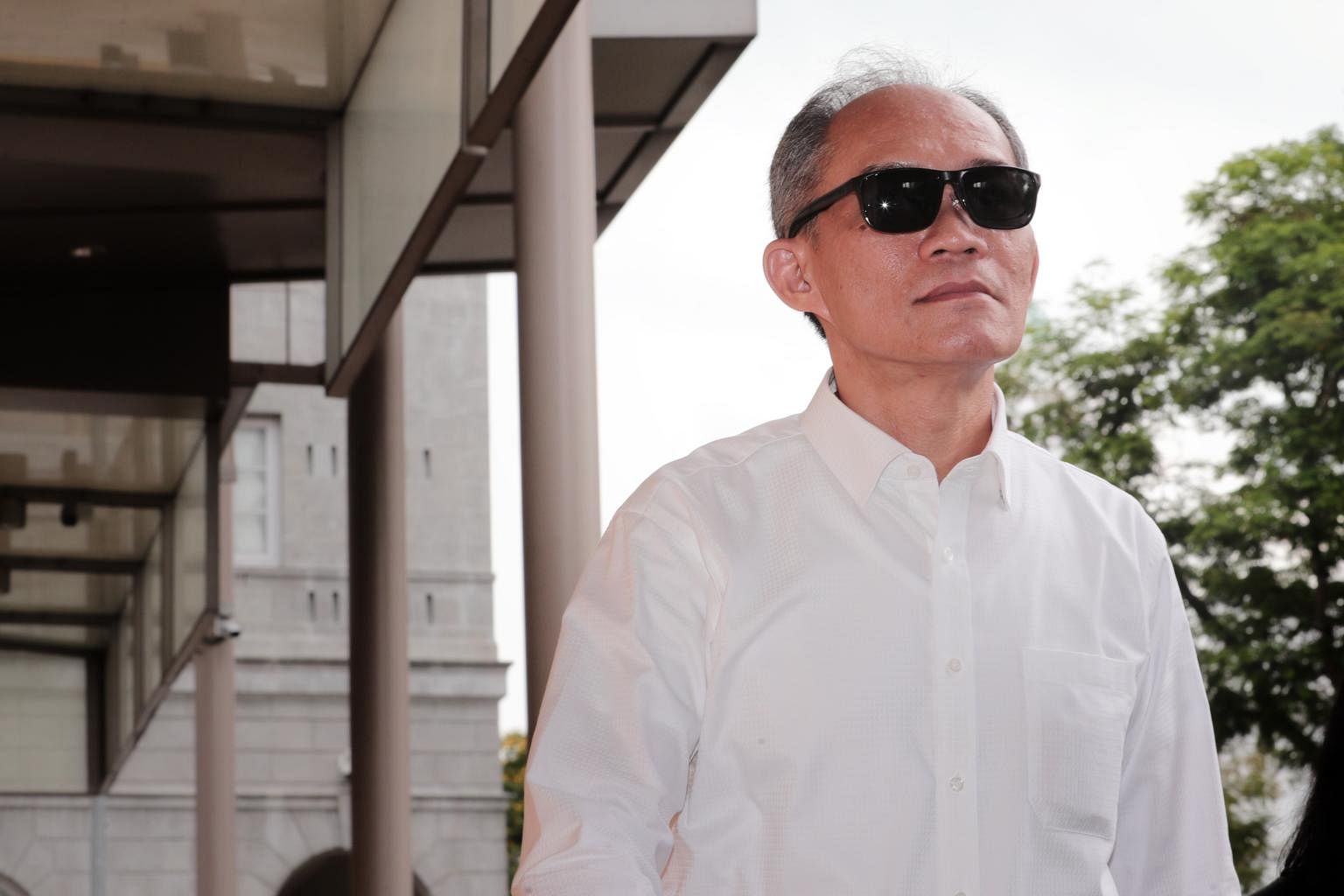Ng
Photographer: Juliana Tan for Bloomberg Businessweek
Businessweek - The Big Take
The Billion-Dollar Nickel-Swap Scandal That Shocked Singapore
Singaporeans invested a billion dollars in Ng Yu Zhi’s nickel-trading company. He’s accused of taking the money and skipping the nickel.
By
Matthew Campbell and
Chanyaporn Chanjaroen
February 11, 2022
Not long after the novel coronavirus arrived in Singapore, forcing the hyperconnected city-state to shut its borders for the first time, a rumor circulated among its many wealthy people—and among others who weren’t so well-off. A little-known investment manager was apparently delivering an astonishing 15% quarterly profit to anyone who invested with him, by trading nickel.
As word spread, more and more Singaporeans clamored to give their money to the investment manager, a 34-year-old ex-accountant named Ng Yu Zhi. Soon Ng’s fund, Envy Group, had raised almost S$1.5 billion ($1.1 billion) from hundreds of clients. He certainly seemed to be making good on the hype, returning steady gains quarter after quarter and giving every appearance of great success, with a mansion in one of Asia’s most expensive neighborhoods, a 126-foot yacht, and a fleet of luxury cars.
Trusting Ng would prove to be catastrophic.
Singapore police arrested him last February and accused him of running perhaps the largest scam, in terms of dollars lost, in the small country’s history. According to police and forensic accountants appointed to examine Ng’s books, the trades he claimed to be making had simply never occurred. Instead, they say, he was engaged in an elaborate fraud, transferring S$475 million of investors’ money to himself and using it to enjoy a lifestyle that was lavish even by the standards of the setting for
Crazy Rich Asians. Ng has yet to enter a plea in response to the 75 charges against him, and he declined to provide a comment for this story, citing ongoing police investigations.
Featured in
Bloomberg Businessweek, Feb. 14, 2022.
Subscribe now.
Source: DEEPOL/plainpicture
His clients included some of Singapore’s most successful citizens: senior lawyers, former bank executives, and businesspeople who should have known better than to invest in what appears, in retrospect, to have been a Ponzi scheme, and not a particularly sophisticated one. They weren’t the only people who failed to ask enough questions. According to legal filings, Ng made more than a thousand transfers from Envy’s corporate and investor funds to bank accounts he likely controlled, misappropriating hundreds of millions of dollars before being stopped.
Investment scams occur all over the world and can last far longer than Envy survived; Bernie Madoff ran a giant Ponzi scheme under the noses of investors and regulators for decades. Still, the allegations against Ng are awkward for Singapore, which is navigating a sensitive national transition. With its stable politics, relatively open borders, and respected legal system, the city is closer than ever to displacing Hong Kong as Asia’s main financial center, a development that would turbocharge its already robust economy. Yet despite Singapore’s orderly reputation, it’s seen more than its share of high-profile scandals in recent years, including the collapse of
Noble Group Ltd., a commodity trading company accused of cooking its books, and an alleged fraud at
Hyflux Ltd., a water utility that entered a court-mandated debt restructuring in 2018, infuriating retail investors.
To some in the city, the apparent ease with which Ng operated suggests that its authorities need to keep a closer eye on the rising tide of cash that’s sloshing in. “I absolutely think Singapore needs to step up its enforcement and oversight of white-collar crime,” says Mak Yuen Teen, a professor of accounting at the National University of Singapore Business School. In the Envy case, “there were many red flags indicating possible fraud. So we have to ask, ‘Where were the circuit breakers?’ ”
Ng incorporated Envy Group in 2015 and decided to focus on nickel.
Photographer: Juliana Tan for Bloomberg Businessweek
Until a few years ago, little about Ng would have marked him as bound for the world of high finance. Soft-spoken and unfailingly polite, with a round, full face, he studied accounting at one of Singapore’s public universities then joined audit firm KPMG LLP. One of the main clients he worked with was BHP Group, the world’s largest mining company, and Ng found that he was fascinated by the metals business, with its huge, liquid markets, real-world industrial needs, and 24/7 volatility. He began trading commodities on the side, and in 2015 he left KPMG to develop his interest into a full-time career.
It was a fortuitous moment to start a trading company. Global commodity prices had declined by roughly half from their 2008 peak, offering the potential for huge profits to anyone with the courage and capital to ride them back up. And there were few better places to do it than Singapore. Always a busy regional hub, the city was emerging as a global financial contender, attracting investments not only from other parts of Southeast Asia but increasingly from India, China, and beyond. Everyone seemed to want a piece of its success. Over the next several years, billionaires including Ray Dalio and Sergey Brin would open local offices to invest their personal wealth; British vacuum-cleaner tycoon James Dyson also set up one and spent a reported S$74 million on a five-bedroom downtown penthouse.
Ng incorporated Envy Group in 2015, taking its name from a slightly cringey line KPMG used in its training sessions: that the company’s goal was to be “the envy” of other accounting providers. He decided to focus on nickel, which was an unusual strategy for a small commodities outfit. The trade was dominated by a handful of well-connected operators, making it challenging to build a business from scratch. But Ng saw nickel as seriously undervalued, with markets failing to price in its growing utility: It’s so
crucial to rechargeable batteries that Tesla Inc. co-founder Elon Musk once asked suppliers to “please mine more.”
Business was excellent, as far as anyone outside of Envy could tell. Nickel prices went on a bull run for most of the second half of the 2010s, and Ng steadily expanded his client list, sometimes with help from Veronica Shim, a successful wealth manager who was impressed enough by Ng that she invested with him herself and offered Envy’s trades to her own clients.
Singapore is a flashy place. On Orchard Road, the main shopping drag, chauffeur-driven Bentleys pull up outside flagship stores for the likes of Harry Winston and Dolce & Gabbana; at the waterfront
Marina Bay Sands casino, high rollers can wager millions before retiring to a 6,400-square-foot “Chairman Suite” on the 53rd floor. But even in a city where the rich delight in showing off their success, Ng stood out. Envy operated from a luxuriously appointed office, arranged around a fully stocked bar from which visitors might be offered a glass of 21-year-old Hibiki whisky, a Japanese treasure that can sell for more than S$200 per pour. Ng liked to meet clients and colleagues at top-drawer sushi restaurants, roaring between engagements in vehicles from a fleet that included a Ferrari, a Lamborghini, and Singapore’s only Pagani Huayra supercar, which he’d spent more than S$7 million to buy.
Cai on the cover of
Prestige.
His home life was no less luxurious. Ng and his Chinese-born wife, Coco Cai, rented a mansion near the lush Botanic Gardens, and he was in the process of buying two others. The pandemic hardly dented their lifestyle. In December 2020,
she told Prestige, an Asian society magazine, how a team of salespeople from Italian jewelry brand Bulgari had come to their home to present a “curated selection” of new pieces “flown in specially for her.” Cai bought four.
Ng did little marketing, but news of the outsize returns he was delivering to investors was spreading, discussed at birthday parties and on golf courses or passed between yacht owners at the Sentosa Cove marina, where Singapore’s super rich keep their vessels. In turn, more and more members of the city’s financial elite sought to entrust him with their money. From Pek Siok Lan, the general counsel of state investment company
Temasek Holdings Pte Ltd., came S$5.6 million. Arun Murthy, former global head of commodities at
Standard Chartered Plc, put in a little less than S$1 million. Finian Tan, one of Singapore’s most prominent venture capitalists, was a major backer; he and partners invested a total of S$26 million.
Few, if any, were perturbed by a March 2020 decision by the Monetary Authority of Singapore, the nation’s main market watchdog, to place Envy on its “
investor alert list,” which flags companies that may be “wrongly perceived as being licensed or regulated by MAS,” and thus appear to be safer. One Envy investor, who asked not to be identified discussing his loss, says it didn’t seem like a major concern: Dozens of funds are placed on the list each year. Nor did it stop hundreds of less wealthy investors, including restaurateurs and doctors, small-business owners and retirees, from giving Ng their money, swelling the total handed over to Envy to almost S$1.5 billion by early 2021. In a city where so many people seemed to be finding ways to get rich, why shouldn’t they?
Put simply, Envy had almost never bought any of the nickel it claimed to be trading
The tropical sun was barely over the horizon when a team of officers from the Commercial Affairs Department, the antifraud unit of the Singapore Police Force, arrived at Ng’s mansion last Feb. 16. He was already up, preparing to send his daughter to school. The officers let him shower and change before taking him to gather documents from Envy’s office and then to a police station.
It turned out Ng had been on investigators’ radar for at least several months. The MAS had received tips about Envy’s operations in mid-2020 and referred the matter to the police later that year. Once Ng was in custody, officers held him for more than two days, questioning him at length about Envy’s operations. After his release, according to people familiar with the matter who asked to remain anonymous in order to describe private conversations, Ng told staff and investors that his detention was the result of a misunderstanding—one that might result, at most, in a slap on the wrist for Envy. Many believed him, one of the people says. Ng appeared more relaxed about the police’s interest in Envy than most of his employees, giving every impression he had little to worry about.
That outward calm was shattered on March 22, when prosecutors filed their first criminal charges against Ng, accusing him of channeling S$300 million of investor money to his own accounts. (Subsequent legal filings pushed the alleged total to just under a half-billion Singapore dollars.) The charges outlined the broad strokes of what police and, later, a team of court-appointed accountants from Ng’s alma mater, KPMG, concluded was an audacious but simple fraud. Put simply, Envy had almost never bought any of the nickel it claimed to be trading, and the returns investors thought they were receiving were in fact drawn from new clients’ deposits—a classic Ponzi structure. Indeed,
Poseidon Nickel Ltd., the Australian mining concern that Ng told investors he was sourcing the metal from, informed KPMG auditors that it had “no business relationship” with Envy and had never entered any transaction with it.
When they looked over Envy’s purported contracts with Poseidon, the accountants, led by Bob Yap, one of Singapore’s best-known restructuring specialists, noticed what they dryly described in an update for the court as “numerous irregularities” in the documents. For one thing, the name of a “director” whose signature appeared on two contracts on behalf of the Australian company did “not appear to match the initials or names of any of Poseidon’s directors in the relevant period.”
Meanwhile, according to the auditors, investor money was being moved in tranches of S$200,000 to accounts likely controlled by Ng, sometimes in dozens of wire transfers per day. Two of Singapore’s major banks,
Oversea-Chinese Banking Corp. and
United Overseas Bank Ltd., were concerned enough by Ng’s activities to
close his accounts well before his arrest. Other lenders, including
DBS Group Holdings Ltd. and
HSBC Holdings Plc, filed suspicious-transaction reports with the authorities but continued doing business with him. DBS and HSBC declined to comment on Ng’s accounts; spokespeople for both lenders said that they have comprehensive systems for flagging suspicious transactions and cooperate fully with law enforcement. An MAS spokesperson said in a statement that the agency expects banks to “implement robust measures to monitor for suspicious transactions” and would take action against firms that fell short of regulatory requirements.
As they dug further, investigators concluded that everything about the nickel deals had been faked, and not especially well. In communications with investors, Envy had said it was selling cargoes to a trading operation called BNP Paribas Commodity Futures Ltd., a London-based unit of the French bank. But U.K. corporate records indicated that this entity had ceased operations in February 2019. Envy’s records nonetheless contained 11 trading statements from after that date—documents that would have to have been forged.
The investigation did find that Envy had conducted one genuine nickel deal. In July and August of 2020, the company spent S$42 million to buy more than 2,000 metric tons of the commodity from Raffemet Pte Ltd., a large trading house. Ng went to a local warehouse to inspect the load, with colleagues recording a video of him looking over loads of nickel pellets. Envy sent the video to its investors, then sold the nickel right back to Raffemet.
The cityscape at dusk.
Source: Anekoho/Agefoto
Ng is awaiting trial in somewhat more straitened conditions than he enjoyed before his arrest. Out on S$4 million bail—one of the largest in Singapore history—he’s swapped his mansion for a serviced apartment. After recent court hearings, he’s departed not in a souped-up sports car but an Audi sedan. He’ll soon face a difficult choice. If he opts to contest the charges against him, he could remain free for years, albeit without the ability to leave Singapore, as the case winds its way through the courts. If he pleads guilty, he’ll likely receive a lengthy sentence, though one that’s shorter than the 20-year maximum he’d probably face if convicted at trial.
The broader damage of Envy’s collapse is still being tallied. Several investors who asked not to be identified in order to avoid being publicly associated with Envy say they don’t expect to recover the bulk of what they lost. It’s not clear how much will be raised from ongoing sales of Ng’s assets, including cars, art, and jewelry. The same is true of a lawsuit filed against him by the KPMG auditors, who are seeking more than S$500 million in damages.
Whatever the ultimate financial cost, the Envy scandal will nudge along efforts to prevent fraud in Singapore as it becomes a more important global hub. Ravi Menon, managing director of the MAS,
acknowledged not long before Ng’s arrest that detecting financial irregularities is “an area that needs to be addressed.” The national stock exchange recently
expanded its enforcement mechanisms, making it mandatory for public companies to institute whistleblower policies and giving itself the power to require a director or executive to resign. Other proposals would give regulators more tools to ensure that accounting companies comply with anti-money-laundering regulations.
But even the most finely tuned regulatory systems can be frustrated by a sufficiently audacious swindler, especially one that’s in tune with the psychological needs of his marks. To win the confidence of so many sophisticated people, Ng appears to have grafted the timeless appeal of get-rich-quick schemes onto a more particular desire: to share in the spoils of a city rising faster than almost any other. Above all, Ng’s investors “trusted the individual,” says Chenthil Kumarasingam, a partner at the law firm Withers KhattarWong, who advises on white-collar crime but wasn’t involved in the Envy case. “He made a very good show of living a lifestyle that everybody aspired to.”
—With Joyce Koh and Yoolim Lee






